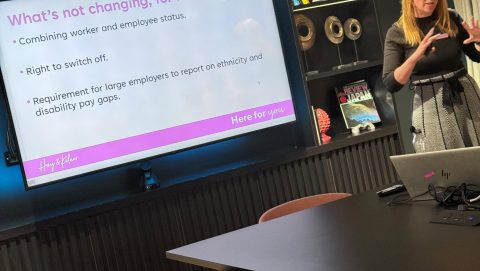
Many staff have been re-evaluating and decided that it is the right time for a career change, retirement or simply just a new challenge. The rise of remote working has also led to candidates looking further afield for roles.
When you are dealing with candidates it’s now more important than ever to follow best practice so that your organisation appears professional, is legally compliant and you can attract and retain the right candidates. Key issues to consider include:
Is your interviewing and recruitment process compliant?
Employer brand is becoming more important. The majority of candidates will not take a job with a company with a bad reputation.
It is important to remember that from the moment a job advert appears or you provide details to a recruiter your obligations in relation to equality start. This starts with the job advert which should fit the requirements of the role and should avoid any potentially discriminatory or off-putting phrases. You should also think about your selection process. Do you ask for an application form? Do you request practical tasks to be completed? These should all be reviewed to ensure that they are not directly or indirectly discriminatory.
Demonstrating that you make decisions fairly is always attractive to a candidate. Most candidates will remember forever if they have been asked a question that they feel is inappropriate. Many younger women have stories about being asked about plans around having a family. Equally, many candidates are still asked inappropriate questions about health. Making sure your managers are guided and trained on this will give you an advantage over your competitors.
Are your employment contracts up to date?
Since April 2020, all employees need to have a contract in place before the first day of their employment. It is best practice to get this document sent across to employees as part of the offer package.
It is really important to ensure your terms and conditions are legally compliant. A candidate who may be being approached by several employers will notice the difference if your terms and conditions seem out of kilter. Since April 2020, contracts of employment need to include additional information under the Good Work Plan review in relation to benefits, paid leave and also training. This can be a great opportunity for you to showcase your organisation.
It is also an opportunity for you to showcase ‘how good an employer you are’ by explaining the benefits and wellbeing steps that you take. Most candidates make their decision about a new position for a range of reasons and salary is just one of them.
Are your wages fair?
There is currently intense pressure on salaries. While your salaries need to be competitive to attract candidates, it is important to ensure wages are still fair across your existing staff to avoid walking into issues around the gender pay gap and equal pay. It is important to keep your principles around pay fair and review your pay rates regularly.
Is your onboarding process working?
Finally, it’s really key that you onboard staff correctly. Make sure you have a set induction process that shows them what they should be doing and how you are going to support them.
Have a probationary period that is stated clearly in your contract and conduct regular reviews during that period. Remember to diarise the end of that period so you can have a constructive conversation with the employee and address any issues.
When you are recruiting, first impressions count – so it’s important to get it right. Investing time to ensure your process is set up to impress will pay dividends in the current marketplace.
Source – https://www.peoplemanagement.co.uk/





















